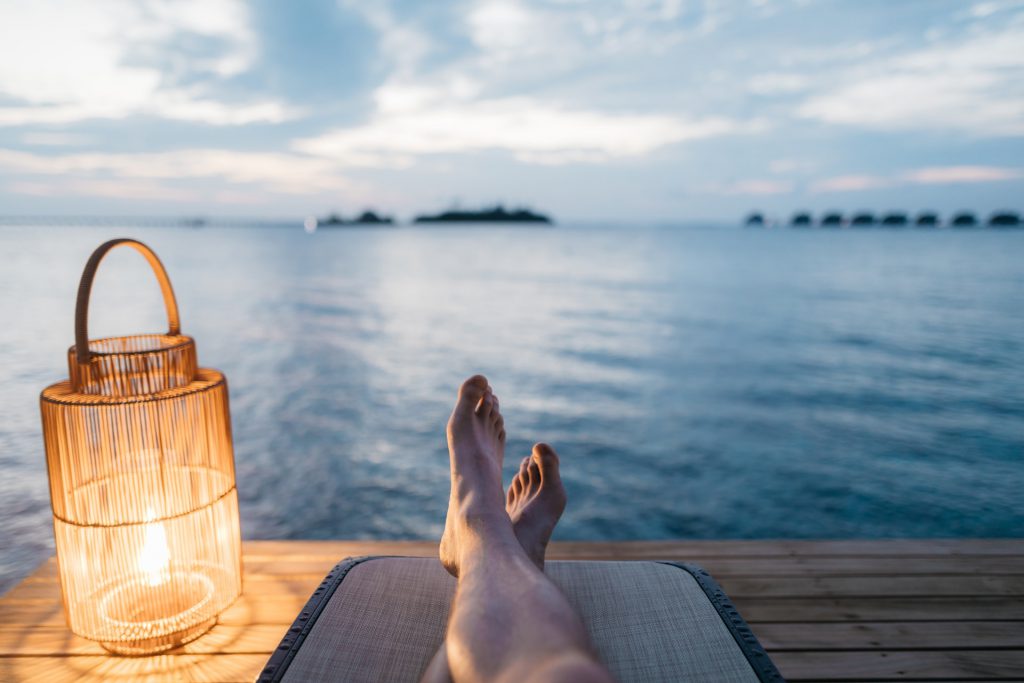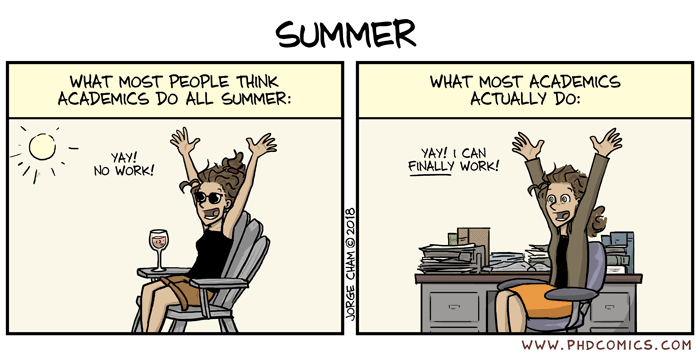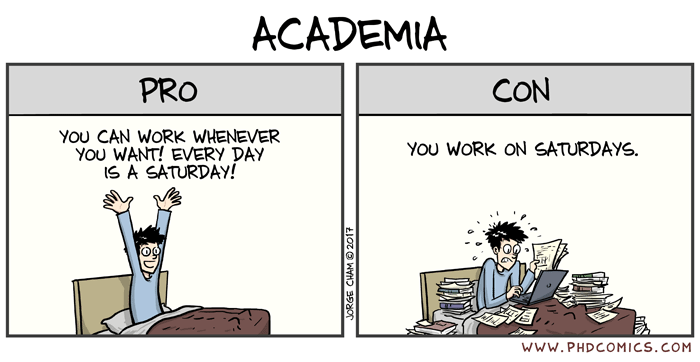Hit the breaks! The importance of taking downtime



This summer got me thinking about how easy it is when you work in academics to just keep on going. Summertime is the time you can take it easy or even go on a holiday, but you may find yourself tempted to (finally) focus on your research since you probably have little teaching obligations.
I have always been focused on planning enough vacation weeks a year, so I can reload and be productive the rest of the time. However, I sometimes forget that during all the other weeks of the year I tend to sacrifice increasing amounts of free time in order to ‘just quickly finish this’. Until recently, I never used to take real breaks, not even for lunch. And I know a lot of people who don’t either. Why is it such a challenge for academics to take enough downtime and vacation?
Why we struggle taking breaks
We can work anytime, and anywhere. Since a big part of our job requires only a computer, we can work wherever we can find a semi-reliable internet connection. Although this has its advantages (you can work from home, in a coffee shop, etc.) it also makes it particularly difficult to separate work and personal life. Especially now that we’ve been working from home for over 4 months (work & life being more intertwined than ever), and will continue to do so for a while, it’s important to think about taking downtime.
Unfortunately however, we are extremely proficient in thinking of reasons for not taking a break. It can be because our work is never done, because we feel guilty about not-working, or because we may feel like we’re too important to be away from work. We may be afraid to be labelled ‘lazy’ if we claim more free time to ourselves, and can sometimes feel like we ‘have to’ keep going because we need to compete with equally hard-working colleagues for competitive grants. In short, it’s always easy to find a reason to say: ‘this is not the right time to take a break, I’m just too busy right now’.
An ode to downtime
Taking time off work is healthy and good for your creativity and productivity. When we rest, we activate a network in our brains (the default mode network) which is suggested to help us reflect on and learn from our experiences, understand new information, and construct creative connections between complex ideas. So it’s no surprise we often get our best ideas while taking a shower or walking around in nature. Even though it may feel counterintuitive, taking breaks during the day and enjoying your free evenings are good for you and your work!
Additionally, it’s important to take a vacation every now and then. Vacations and traveling allow us to detach from work, which enables you to psychologically and physically recharge. A failure to recover from work stress can result in reduced well-being and mental health complaints such as burn-out, depressive symptoms, and stress. Too much work and not enough downtime recovery is simply not good for us!
The art of actually taking a break
Mental shift
Ok so taking downtime is important, but we had so many reasons to not take enough of it. Maybe we should first try to make a mental shift. First, we can try to realize (and accept) that we’re not as important as we might like to think. No matter how important your position: you can be missed (at least for a couple of weeks a year). Second, we need to stop feeling guilty about not-working. When you work in Europe, you are legally allowed to take an x number of vacation days each year. You’re not cutting anyone short if you actually use them! I am trying to get there by attempting to ignore those who are surprised to hear I don’t have my work-email and slack on my private phone, and by reminding myself that I really am more creative and productive when I also take breaks and travel.
Walk the talk
During Corona ‘smart’ lockdown I picked up the habit to actually take breaks and to go outside and walk during these breaks. Sometimes I go with a colleague or friend, other times I go alone, usually listening to a podcast on my phone. Although I thought I was doing a good job, the last (Dutch) podcast I listened to during a break told me I was doing it all wrong. In order to activate the default mode network, it’s better if you don’t get any new information and just let your mind wander. So this also means no reading news or checking social media during a break! Something I obviously still have to work on…
Vacation versus staycation
There are lots of differences in how people choose to spend their holidays. While some people prefer to go away for short periods of time and/or stay at home instead of travel, others like to be away for a couple of weeks in a row, and travel to foreign countries. Although any extended time you take off work will probably help you to recharge, it appears that people seem to detach from work more when they actually leave their home during vacations. During travel, people sleep more, take part in more social and less obligatory activities than when they stay home. There is a larger mental distance from everyday worries, and people experience higher hedonic well-being and less ruminative thinking when they’re away. So whether you go only for a weekend or a longer period of time, it is worth the effort to make trips away from home. Even now with restricted travel during the Corona crisis, there are probably places within your own country you can visit.
Now that this blog is finished, I think I have deserved a nice afternoon at the beach! I wish everyone a great and relaxing summer!
Contact
Erasmus University Rotterdam
Mandeville Building T13
Burgemeester Oudlaan 50
3062 PA Rotterdam, the Netherlands

